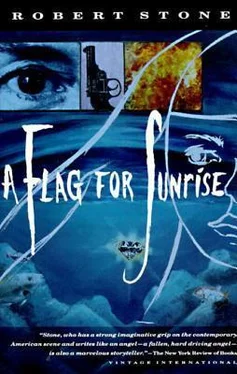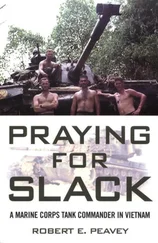Robert Stone - A Flag for Sunrise
Здесь есть возможность читать онлайн «Robert Stone - A Flag for Sunrise» весь текст электронной книги совершенно бесплатно (целиком полную версию без сокращений). В некоторых случаях можно слушать аудио, скачать через торрент в формате fb2 и присутствует краткое содержание. Год выпуска: 2012, Издательство: Vintage, Жанр: Современная проза, на английском языке. Описание произведения, (предисловие) а так же отзывы посетителей доступны на портале библиотеки ЛибКат.
- Название:A Flag for Sunrise
- Автор:
- Издательство:Vintage
- Жанр:
- Год:2012
- ISBN:нет данных
- Рейтинг книги:4 / 5. Голосов: 1
-
Избранное:Добавить в избранное
- Отзывы:
-
Ваша оценка:
- 80
- 1
- 2
- 3
- 4
- 5
A Flag for Sunrise: краткое содержание, описание и аннотация
Предлагаем к чтению аннотацию, описание, краткое содержание или предисловие (зависит от того, что написал сам автор книги «A Flag for Sunrise»). Если вы не нашли необходимую информацию о книге — напишите в комментариях, мы постараемся отыскать её.
A Flag for Sunrise — читать онлайн бесплатно полную книгу (весь текст) целиком
Ниже представлен текст книги, разбитый по страницам. Система сохранения места последней прочитанной страницы, позволяет с удобством читать онлайн бесплатно книгу «A Flag for Sunrise», без необходимости каждый раз заново искать на чём Вы остановились. Поставьте закладку, и сможете в любой момент перейти на страницу, на которой закончили чтение.
Интервал:
Закладка:
At the airport, the Union Jack flew over the terminal building; shirtless, red-necked gunners lounged beside emplacements covered with camouflage netting. When the cabin door was opened a warm wet wind sifted through the compartment — and looking out at the palm trees and the guns and the lines of parked deuce-and-a-halfs it was impossible for him not to think back. But of course it was not at all the same, only the comic rumor of a war that would never be fought between the Sherwood Foresters and a phantom army of Guatemalan conscripts.
Two men with fishing-rod cases got off at Belize. The DC-8 took off again and the sea fell away behind it; it climbed over a floor of rain forest and cleared the wall of the cordillera — range after range broken by sunless valleys over which the clouds lowered, brown peaks laced with fingers of dark green thrust up from the jungle on the lower slopes. And in less than an hour — in a slender valley refulgent and shimmering — the white city of Compostela, on twin hills, walled in by snow peaks and two spent volcanoes.
From the air, the city was one of the great sights of America, but it was a frightening place to fly into if one knew the stories and the statistics. There was a sign at the airport that marked off the number of days since the last fatal accident. The Compostelans meant it to be somehow reassuring; they were always picking up North American-type public relations notions and getting them slightly wrong. On Holliwell’s last trip down the sign had marked off one hundred and eight days.
He stepped off the plane into what felt like June sunlight; the air was clear as sweet water, the sky mountain blue. Three-thirty in the afternoon at seventy degrees.
The customs search, under the guns of young Indian soldiers in blue fatigues, was long and wearying. It reflected the American AID training of the inspectors modified by local conceptions of official dignity and foreign vice. There was a man in his dotage who asked everyone, banker, missionary, elderly tourist, if they had any marijuana. There was a young madman, someone’s unemployable relative, who wore extremely thick glasses, talked to himself during the inspection and laughed openly at the contents of people’s suitcases.
Compostela was an odd place. It enjoyed a reputation for progressive politics which alarmed conservatives in the United States. Local malcontents, if they were naïve enough to be confused by the official rhetoric into any form of organized activism, were quickly dissuaded, sometimes terminally, by the police or by mysterious, widely deplored auxiliaries with names like the Knights of Mary or the Brotherhood of the Holy Ghost.
Occasionally, the government voted against the United States at the UN and entertained a Bulgarian vice-premier. The octogenarian national poet was periodically dispatched to Havana for cigars. But the Compostelan honchos were hustling arrivistes for whom a buck was a buck; the rest was bullshit and Bellas Artes. The foreign business community regarded their government as sound.
Compostela’s reserve of international goodwill was funded mainly by the fact of its contiguity with Tecan, where, as even the most flint-hearted Compostelan cacique would gravely admit, everything was perfectly dreadful.
The porter who carried Holliwell’s bag from customs stood by while he waited at the currency exchange counter. The notes in Compostela were yellow and brown and were officially called grenadas although the people called them pesos , sometimes morenos. The singles carried the picture of a Negro doctor whom the Compostelans claimed had discovered the quinine treatment for malaria.
Holliwell put one in the porter’s hand — they were worth forty cents. The porter grunted — times had changed — and left him to carry his own bag through the glass doors of the terminal and to dismiss the boys who sought to take it from him.
Oscar Ocampo was leaning against his little Toyota in the nearest parking row. Walking toward him, Holliwell saw that he had gone fat. There was a bulge of gut over his belt and under the green cloth of his tennis shirt. His hard Indian face was softened and blurred by jowl.
Holliwell threw him a salute, still marveling at how different he looked under the extra weight. Much more European; with his little pointed beard, like an Italian tenor made up for Otello.
He was smiling broadly as he reached out for Holliwell’s bag; he looked somehow relieved. When the bag was safely in the car, they embraced.
“How does it feel to be here again?”
“Good,” Holliwell said. The volcano and the glacial peaks above the town always surprised. They made a man smile to see them. “It always feels good.”
“ La dulce cintura de América ,” Oscar said. So Rubén Darío had called Central America, the sweet waist of the joined continents, every schoolchild there knew it, everyone recited it, often without irony. With Oscar it was always a little ironic, always genuinely felt.
“May we speak English?” Oscar asked.
“Sure,” Holliwell said. He would have preferred practicing his Spanish on a friend. His address to the university would be in that language.
“How are things?”
“With me,” he said, “pretty much the same as always. Everyone’s well, thank God.”
“Good,” Oscar said. “And they gave you tenure?”
Holliwell laughed at his question. In fact, it annoyed him.
“Oh yes. I have tenure in my life too. But I’m not sure it’s the right one.”
“Don’t complain to me,” Oscar said, starting up the car. “That’s a stylized demurrer. You’re very lucky.”
“How about with you?”
They drove off down the airport road and turned onto the stretch of the Pan-American Highway that led to the capital. Oscar smiled straight ahead at the road.
“A long story. The moral is that nothing is free.”
Holliwell resisted an urge to ask him at once about Marty Nolan.
“Laura and I are split,” Oscar told him. “We are pffft.”
“That’s bad news,” Holliwell said. “Am I wrong?”
“I wish I knew,” Oscar said.
The Pan-American Highway took them past stock corrals and unfenced fields where lean cattle grazed. After a few miles they passed the steel-rolling mill, the flagship of Compostelan industry; there was a neat, trim government clinic beside it, then a village of square concrete houses and crate shacks.
At the edge of the city there was a floral clock surmounted by the statue of an Indian chieftain who had resisted the Conquest. Beyond that the carretera became the Avenida Morazón, an imitation of the Reforma and Compostela’s bright daydream of itself. On one side was the central park with its thousand eucalyptus trees, on the other the public buildings with Buck Rogers ramps and reflecting pools full of papaya rinds and mosquito larvae. Beyond the park was the National University, which had employed Oscar, and the Museum of Anthropology. To the left of the Avenida was a neighborhood of middle-class houses with small lawns enclosed by low cement walls; behind it one could see the shanty towns that climbed the inward slopes of Compostela’s twin hills.
A mile or so from the central square stood the Panamerica-Plaza hotel, its fifteen stories of steel and tinted glass defying Compostela’s unquiet crust, surrounded by parkland in which there were lawns and ceiba trees and tame parrots.
Oscar eased the car out of the Avenida traffic and into the Panamerica-Plaza’s driveway.
“I made a reservation for you here,” he told Holliwell. “We don’t have the house anymore.”
“Well,” Holliwell said. He had always disliked the hotel. It was a resort of the high rollers who had battened on the country; the shoeshine boys, the hustlers who lurked at the end of its palm-lined driveway made him feel ashamed. “Well,” he said, “I’ve never stayed here.”
Читать дальшеИнтервал:
Закладка:
Похожие книги на «A Flag for Sunrise»
Представляем Вашему вниманию похожие книги на «A Flag for Sunrise» списком для выбора. Мы отобрали схожую по названию и смыслу литературу в надежде предоставить читателям больше вариантов отыскать новые, интересные, ещё непрочитанные произведения.
Обсуждение, отзывы о книге «A Flag for Sunrise» и просто собственные мнения читателей. Оставьте ваши комментарии, напишите, что Вы думаете о произведении, его смысле или главных героях. Укажите что конкретно понравилось, а что нет, и почему Вы так считаете.












